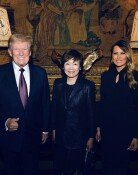“Iraq Tempest” Hits Election Campaigns
“Iraq Tempest” Hits Election Campaigns
Posted April. 09, 2004 21:43,
A series of insurgents’ abductions of Koreans in Iraq has turned the country’s dispatch of a military contingent to the Middle Eastern country into a new point of contention as the country is preparing to go to the polls to elect new lawmakers.
The Grand National Party (GNP) and United Liberal Democrats (ULD) expressed support for the dispatch of troops, while the Millennium Democratic Party (MDP) demanded a complete review of the plan. Demand for rescheduling the troop dispatch is also rising within the Uri Party. All in all, debate over the issue has begun to rage on among politicians.
“The resolution passed at the National Assembly should be respected. The world is looking at this country’s credibility,” GNP Chairwoman Park Geun-hye said in a meeting with journalists on April 9, readdressing her support for the Iraqi contingent. “There is no room in the international community for a country which breaks its own promises.”
“However, the government should respond properly to the drastically changing situation by re-determining the nature and timing of the troop dispatch,” she said, offering some flexibility in mulling over the issue.
The GNP is guarding against the emergence of the issue as a major election debate as the Iraq factor could recast the electoral landscape and dampen the party’s recent upward trend.
“The dispatch of troops to Iraq is a promise made by the country. It must be kept,” LDU chairman Kim Jong Pil said on his campaign trail on April 9.
At the Uri Party, the scene during January, in which members managed to pass the pro-dispatch resolution after turns and twists, has appeared to rerun.
“There is no changes in the principle of sending troops to Iraq,” Uri Party chairman Chung Dong-young. “However, the new situation should be carefully studied. New responses will be needed for the new situation.” Floor leader Kim Geun-tae opined expressing his disagreement with the party leadership, “It is highly desired that the troops should be sent to Iraq in June when the transfer of power from the U.S. to the Iraqi provisional government completes.”
Kim’s remarks are widely interpreted as a position taken by Uri Party supporters who oppose the Iraq contingent. The Uri Party is weighing between its responsible posturing as the ruling party and its attempts to rallying supporters.
Some executives expect that the Iraq factor, together with the Roh impeachment, will help rekindle support for the Uri Party.
The MDP expects the Iraq issue will tilt the political balance in favor of it. The party sent an advisory directive against the pro-war resolution in January, which will now politically set itself apart from both the GNP and Uri Party.
“The GNP and Uri Party are insisting on sending troops to the U.S.’s illegitimate war. This is a clear case of GNP-Uri collusion for the destruction of peace,” MDP campaign manager Choo Mi-ae said. “The troop issue needs a complete review from scratch.”
The MDP is attempting to use the issue to bring back its traditional supporters who have recently turned their backs on the party and incited dispute within the Uri Party.
“GNP chairwoman Park and Uri Party chairman Chung must resign for their support for troop dispatches immediately when our people are victimized in Iraq,” Democratic Labor Party chairman Kwon Young-gil said. “The KDLP will become the third largest party in the elections and quash the Iraq contingent resolution.”
Headline News
- Joint investigation headquarters asks Yoon to appear at the investigation office
- KDIC colonel: Cable ties and hoods to control NEC staff were prepared
- Results of real estate development diverged by accessibility to Gangnam
- New budget proposal reflecting Trump’s demand rejected
- Son Heung-min scores winning corner kick







